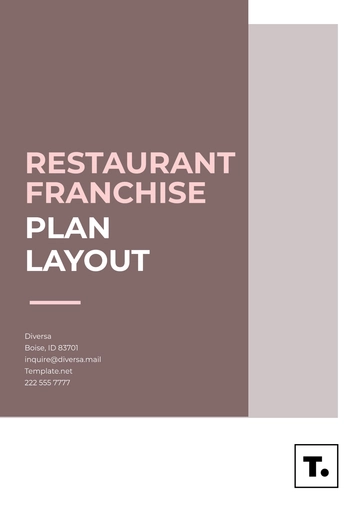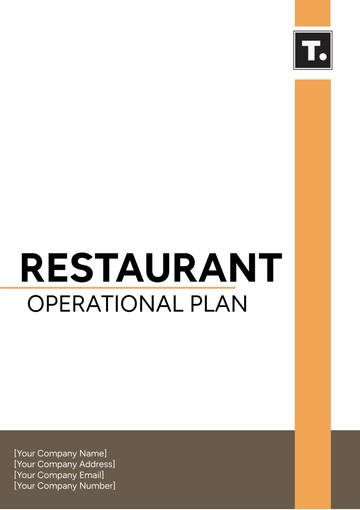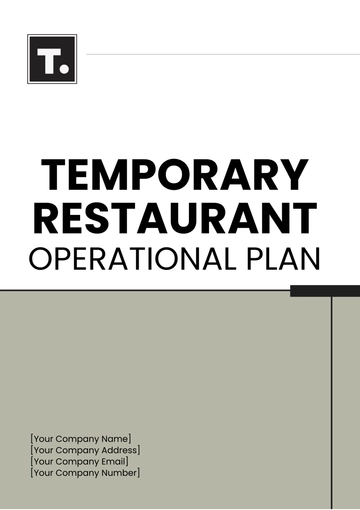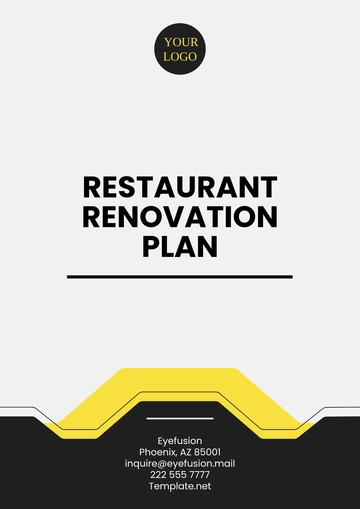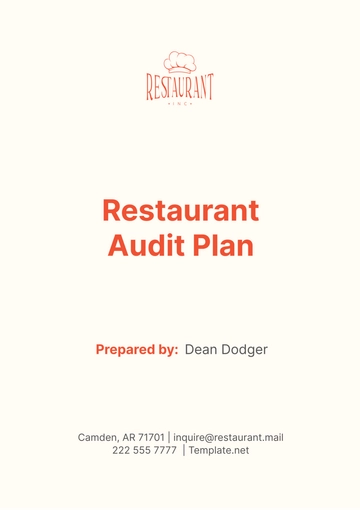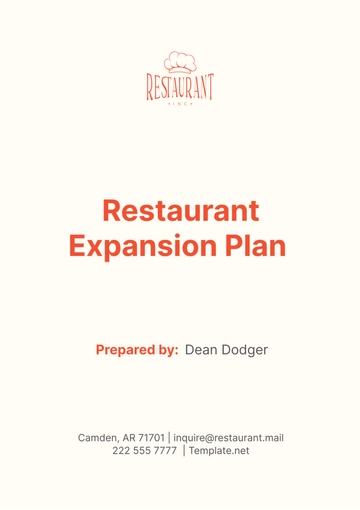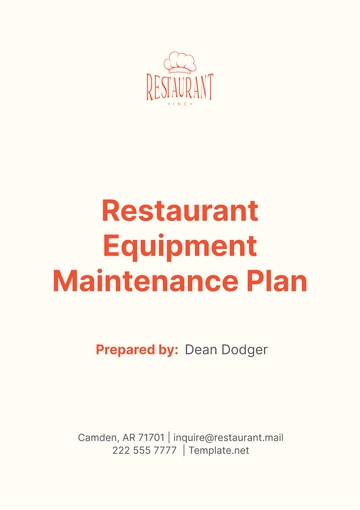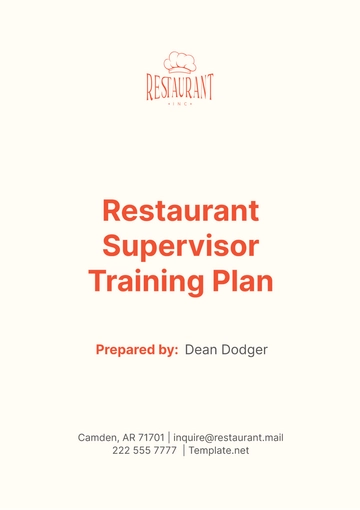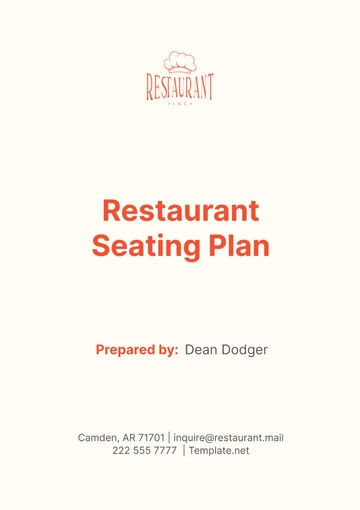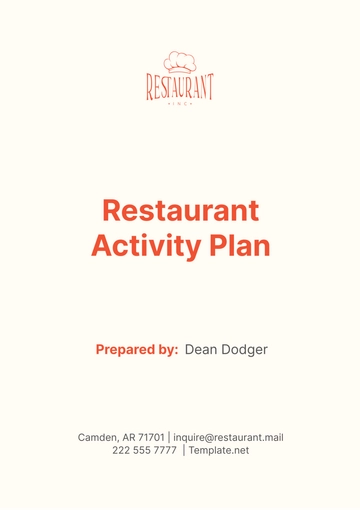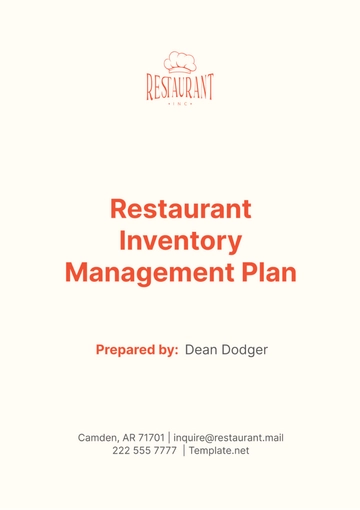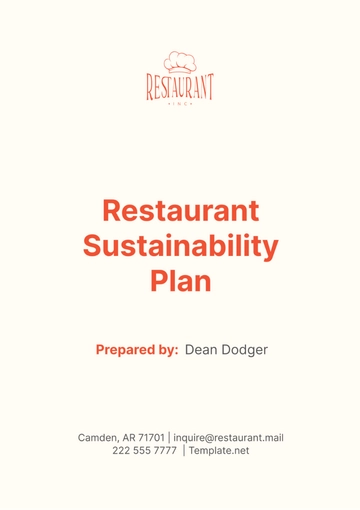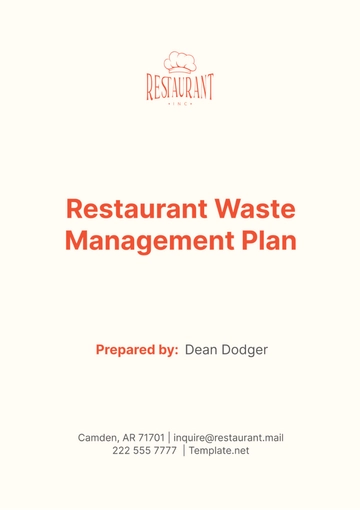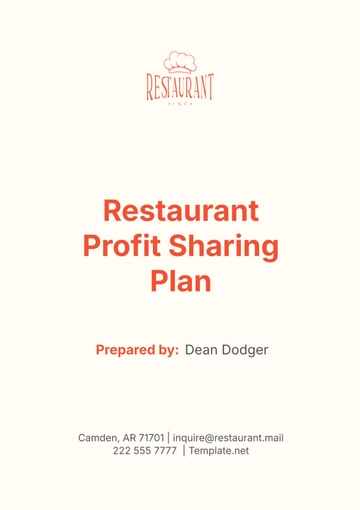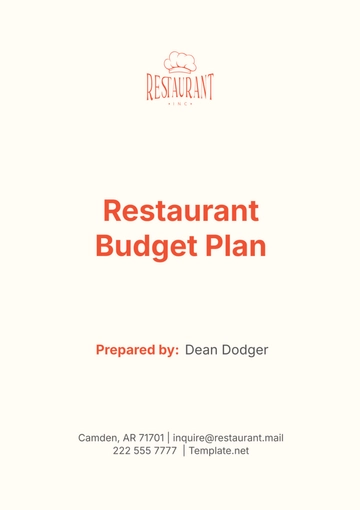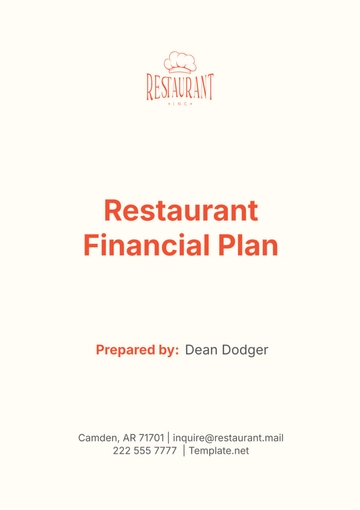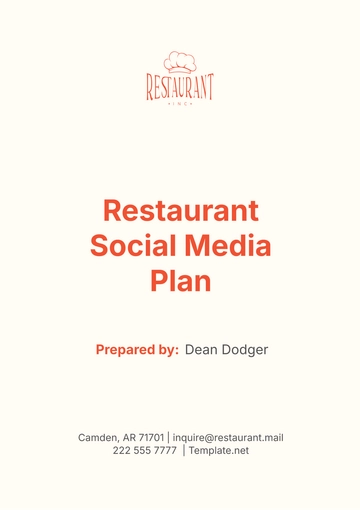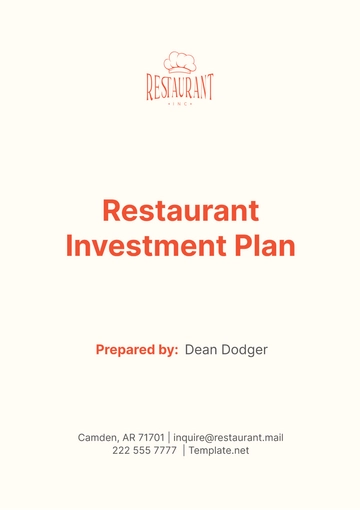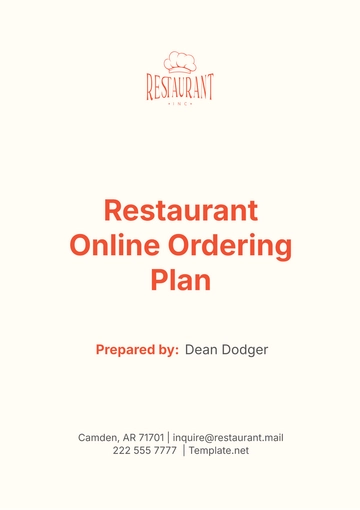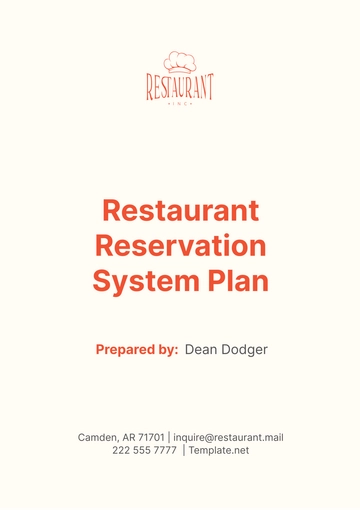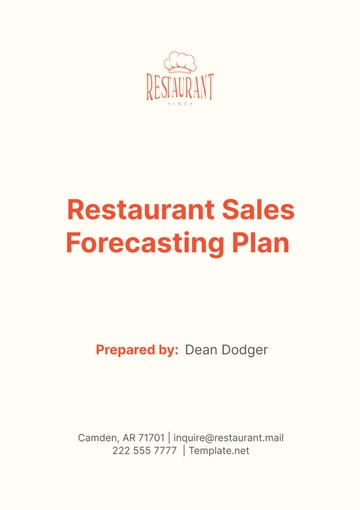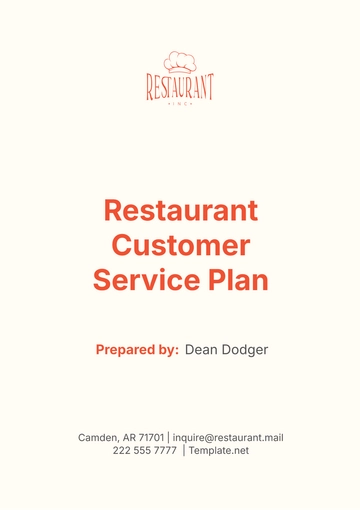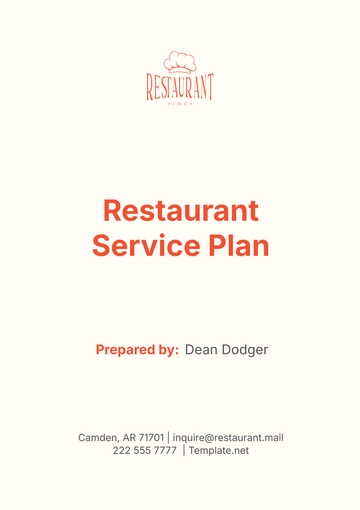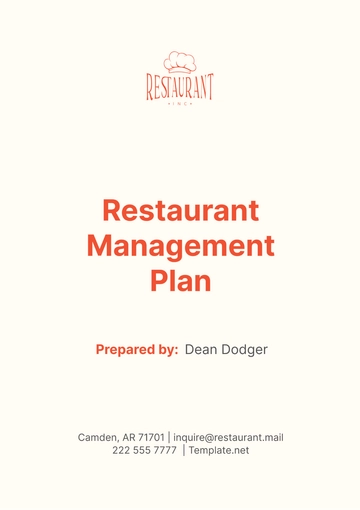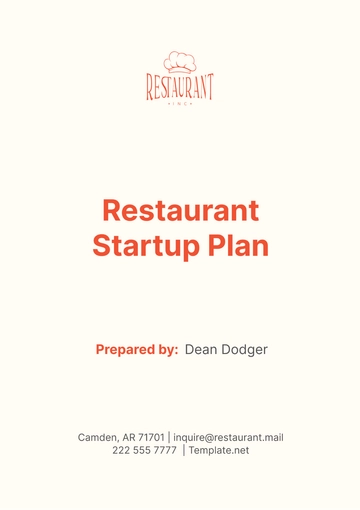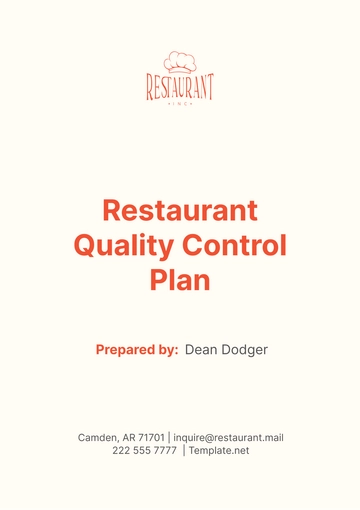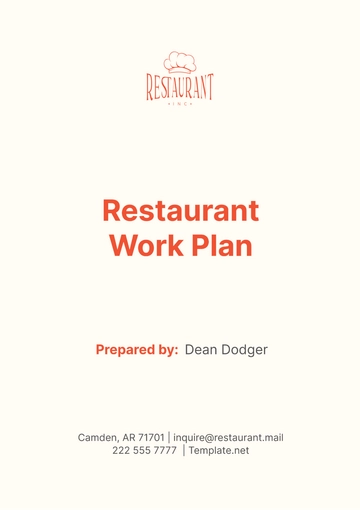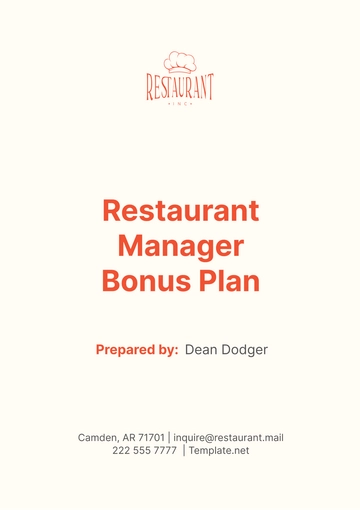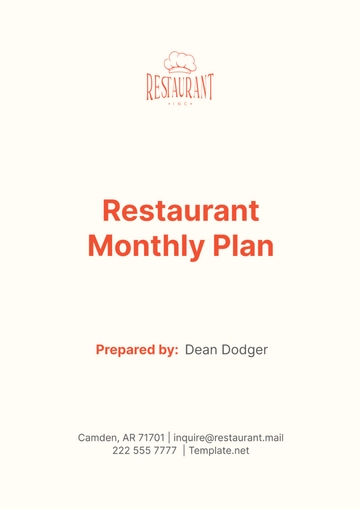Free Restaurant Customer Service Plan
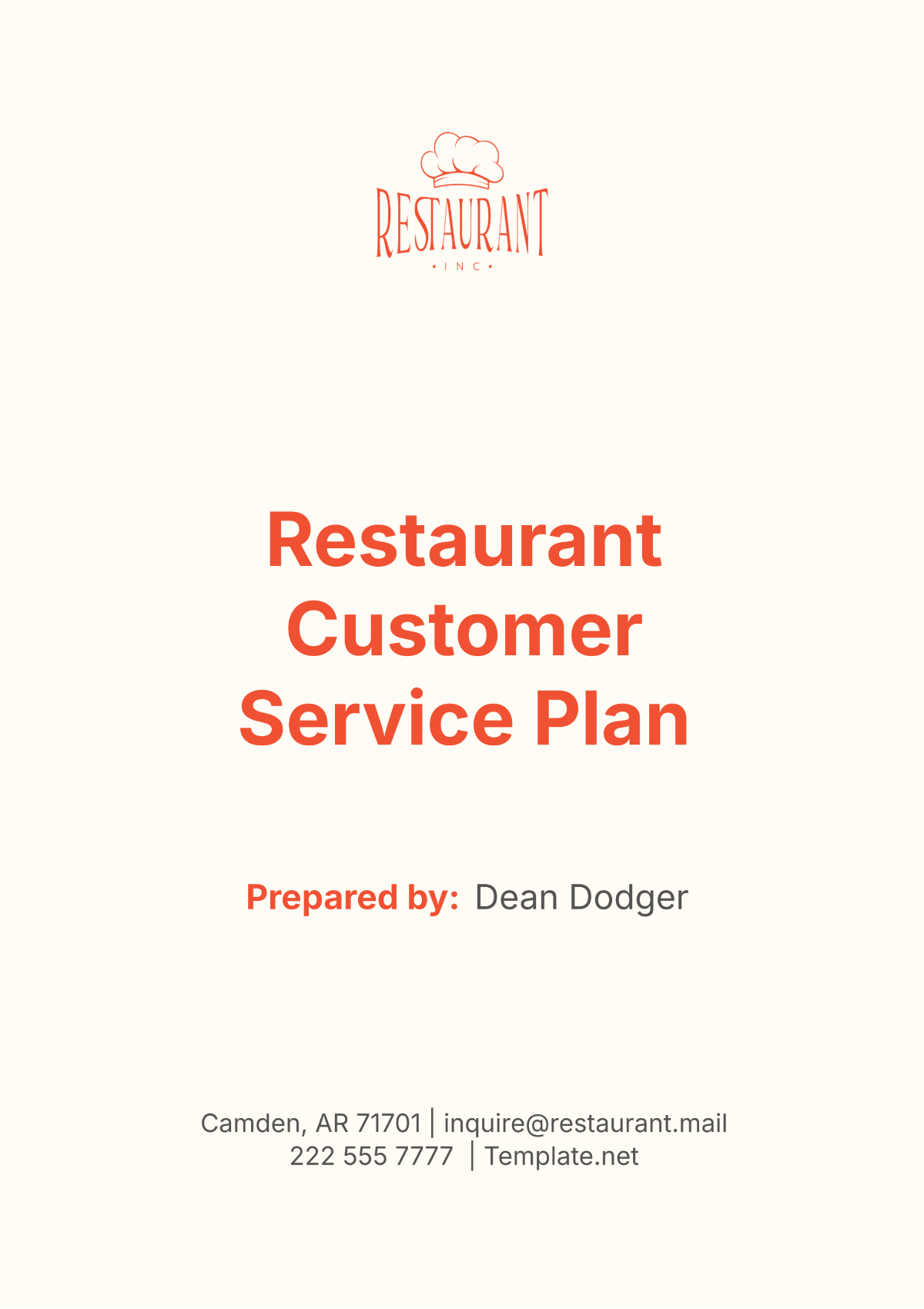
I. Objective
The primary aim of the Restaurant Customer Service Plan is to ensure an exceptional guest experience at [Your Company Name]. Key objectives include ensuring attentive, personalized service, delivering high-quality food promptly, and maintaining a clean, welcoming environment. Central to achieving these goals is comprehensive staff training in effective customer interaction, timely problem resolution, and proactive service enhancement.
Additionally, the plan emphasizes the importance of continuous improvement through structured feedback systems. By actively seeking and analyzing guest feedback, we can identify areas for improvement and implement necessary changes promptly. This approach ensures that we consistently meet and exceed guest expectations, fostering loyalty and repeat business.
Finally, personalizing guest services and fostering a culture of excellence are critical components of our strategy. By understanding and anticipating individual guest preferences, we can tailor our service to create memorable dining experiences. This commitment to excellence not only enhances guest satisfaction but also generates positive word-of-mouth referrals, contributing to the long-term success of [Your Company Name].
II. Staff Training and Development
Empowering our team is pivotal for the success of [Your Company Name]. This staff training program ensures that every team member is equipped not only to meet but exceed customer expectations, creating impactful and memorable dining experiences. By prioritizing continuous development, we foster a culture of excellence and a commitment to exceptional service.
Training Component | Description | Frequency |
|---|---|---|
Comprehensive Onboarding Sessions | Focus on customer service excellence, including company values, service standards, and guest interaction protocols. | Initial hire |
Regular Workshops | Cover conflict resolution, effective communication, and upselling techniques to enhance service quality and sales. | Quarterly |
Role-Playing Scenarios | Simulate various customer service challenges to practice and improve problem-solving skills and service delivery. | Monthly |
Ongoing Feedback and Performance Reviews | Provide constructive feedback and conduct performance reviews to foster continuous learning, improvement, and recognition of excellence. | Bi-monthly |
This strategy ensures that every team member is equipped, not only to meet but exceed customer expectations, creating impactful and memorable dining experiences.
III. Environment and Atmosphere
Maintaining a pristine and welcoming environment is crucial for an optimal customer experience at [Your Company Name]. These measures include regular cleanliness audits, ensuring functional decor that complements our ethos, and carefully monitoring dining area setups. By prioritizing these elements, we not only create a positive ambiance but also reinforce our brand’s commitment to excellence and meticulous attention to detail, contributing significantly to the overall customer satisfaction.
Environmental Aspect | Description | Frequency |
|---|---|---|
Regular Cleanliness Audits | Conduct thorough inspections of all dining and kitchen areas to ensure adherence to hygiene standards. | Weekly |
Functional Decor Maintenance | Evaluate and maintain décor elements that reflect and enhance the brand ethos, ensuring alignment with the overall dining experience. | Bi-annually |
Dining Area Setup Monitoring | Regular checks and adjustments to dining setups to maximize comfort and convenience for all guests, accommodating diverse needs. | Daily |
IV. Feedback Implementation
To continuously enhance our service quality at [Your Company Name], implementing a robust feedback system is indispensable. This plan includes encouraging real-time feedback during visits, using digital tools such as surveys and feedback forms, and regularly reviewing this input to pinpoint improvement areas and recognize successes. This feedback loop ensures that our service remains dynamic and responsive to guest needs and preferences, fostering a culture of transparency and adaptability that aligns with our commitment to excellence.
Feedback Method | Description | Frequency |
|---|---|---|
Real-Time Guest Feedback | Encourage guests to provide immediate feedback during their visit through verbal communication with staff. | During each visit |
Digital Feedback Tools | Utilize digital surveys and feedback forms accessible via QR codes placed on dining tables, enabling easy guest participation. | Post-visit (accessible any time) |
Regular Feedback Review and Analysis | Conduct systematic reviews of all collected feedback to identify trends, areas for improvement, and instances of excellence. | Monthly |
V. Personalization of Guest Services
To further enhance guest satisfaction and retention at [Your Company Name], personalized services are an integral part of our Restaurant Customer Service Plan. This includes remembering and acknowledging repeat guests by their preferences, offering custom dining suggestions based on past orders, and celebrating special occasions with personalized touches. Through these strategies, we aim to provide a unique and memorable dining experience that encourages guests to revisit and recommend our restaurant, thereby fostering long-term relationships and loyalty.
Personalization Strategy | Description | Implementation Method |
|---|---|---|
Recognition of Repeat Guests | Acknowledge repeat guests by name and remember their preferences to make them feel valued and build a personal connection. | Database of guest profiles |
Custom Dining Suggestions | Offer tailored dining suggestions based on historical data of past orders and known dietary preferences. | AI-driven recommendation system |
Celebrations for Special Occasions | Enhance guest experiences by offering personalized offers or decor for birthdays, anniversaries, or other special events. | Event-based customization options |
VI. Technology Integration
To streamline operations and enhance customer experiences, [Your Company Name] will integrate advanced technology solutions throughout the restaurant. This includes:
Technology Application | Description | Implementation Method |
|---|---|---|
Mobile Ordering and Payment Systems | Enable guests to order and pay through a mobile app, reducing wait times and improving order accuracy. | Integration with existing POS systems |
Table Management Software | Utilize software to optimize seating arrangements and waitlist management, ensuring efficient table turnover. | Deployment across all service areas |
Digital Menu Boards | Implement dynamic digital menus for real-time updates on offerings and availability, enhancing guest engagement. | Installation at key points in the restaurant |
These technological enhancements aim to improve operational efficiency and customer satisfaction by providing seamless service and interactive experiences. The integration of these tools allows [Your Company Name] to adapt to modern dining expectations and remain competitive in the hospitality industry.
VII. Community Engagement and Sustainability Practices
[Your Company Name] is committed to strengthening community ties and promoting sustainability through responsible practices:
Community and Sustainability Initiative | Description | Implementation Method |
|---|---|---|
Local Supplier Partnerships | Source ingredients from local farms and producers to support the community and reduce carbon footprint. | Establish contracts with local vendors |
Waste Reduction Programs | Implement measures to minimize waste, including composting and recycling initiatives. | Staff training and waste sorting systems |
Community Events and Outreach | Host and participate in local events to foster community relations and promote the restaurant as a community hub. | Coordination with local organizations |
By embracing these initiatives, [Your Company Name] not only enhances its service offerings but also contributes positively to environmental sustainability and community well-being. This approach helps build a loyal customer base that values ethical and community-focused practices.
- 100% Customizable, free editor
- Access 1 Million+ Templates, photo’s & graphics
- Download or share as a template
- Click and replace photos, graphics, text, backgrounds
- Resize, crop, AI write & more
- Access advanced editor
Enhance your restaurant’s service excellence with Template.net's Restaurant Customer Service Plan Template. This editable and customizable tool ensures your team delivers top-tier service consistently. Conveniently editable in our AI Editor Tool, it’s crafted to meet unique business needs. Elevate your dining experience, exceed customer expectations, and stand out in the competitive hospitality market today with our expert-designed template.
You may also like
- Finance Plan
- Construction Plan
- Sales Plan
- Development Plan
- Career Plan
- Budget Plan
- HR Plan
- Education Plan
- Transition Plan
- Work Plan
- Training Plan
- Communication Plan
- Operation Plan
- Health And Safety Plan
- Strategy Plan
- Professional Development Plan
- Advertising Plan
- Risk Management Plan
- Restaurant Plan
- School Plan
- Nursing Home Patient Care Plan
- Nursing Care Plan
- Plan Event
- Startup Plan
- Social Media Plan
- Staffing Plan
- Annual Plan
- Content Plan
- Payment Plan
- Implementation Plan
- Hotel Plan
- Workout Plan
- Accounting Plan
- Campaign Plan
- Essay Plan
- 30 60 90 Day Plan
- Research Plan
- Recruitment Plan
- 90 Day Plan
- Quarterly Plan
- Emergency Plan
- 5 Year Plan
- Gym Plan
- Personal Plan
- IT and Software Plan
- Treatment Plan
- Real Estate Plan
- Law Firm Plan
- Healthcare Plan
- Improvement Plan
- Media Plan
- 5 Year Business Plan
- Learning Plan
- Marketing Campaign Plan
- Travel Agency Plan
- Cleaning Services Plan
- Interior Design Plan
- Performance Plan
- PR Plan
- Birth Plan
- Life Plan
- SEO Plan
- Disaster Recovery Plan
- Continuity Plan
- Launch Plan
- Legal Plan
- Behavior Plan
- Performance Improvement Plan
- Salon Plan
- Security Plan
- Security Management Plan
- Employee Development Plan
- Quality Plan
- Service Improvement Plan
- Growth Plan
- Incident Response Plan
- Basketball Plan
- Emergency Action Plan
- Product Launch Plan
- Spa Plan
- Employee Training Plan
- Data Analysis Plan
- Employee Action Plan
- Territory Plan
- Audit Plan
- Classroom Plan
- Activity Plan
- Parenting Plan
- Care Plan
- Project Execution Plan
- Exercise Plan
- Internship Plan
- Software Development Plan
- Continuous Improvement Plan
- Leave Plan
- 90 Day Sales Plan
- Advertising Agency Plan
- Employee Transition Plan
- Smart Action Plan
- Workplace Safety Plan
- Behavior Change Plan
- Contingency Plan
- Continuity of Operations Plan
- Health Plan
- Quality Control Plan
- Self Plan
- Sports Development Plan
- Change Management Plan
- Ecommerce Plan
- Personal Financial Plan
- Process Improvement Plan
- 30-60-90 Day Sales Plan
- Crisis Management Plan
- Engagement Plan
- Execution Plan
- Pandemic Plan
- Quality Assurance Plan
- Service Continuity Plan
- Agile Project Plan
- Fundraising Plan
- Job Transition Plan
- Asset Maintenance Plan
- Maintenance Plan
- Software Test Plan
- Staff Training and Development Plan
- 3 Year Plan
- Brand Activation Plan
- Release Plan
- Resource Plan
- Risk Mitigation Plan
- Teacher Plan
- 30 60 90 Day Plan for New Manager
- Food Safety Plan
- Food Truck Plan
- Hiring Plan
- Quality Management Plan
- Wellness Plan
- Behavior Intervention Plan
- Bonus Plan
- Investment Plan
- Maternity Leave Plan
- Pandemic Response Plan
- Succession Planning
- Coaching Plan
- Configuration Management Plan
- Remote Work Plan
- Self Care Plan
- Teaching Plan
- 100-Day Plan
- HACCP Plan
- Student Plan
- Sustainability Plan
- 30 60 90 Day Plan for Interview
- Access Plan
- Site Specific Safety Plan
